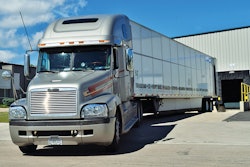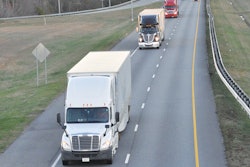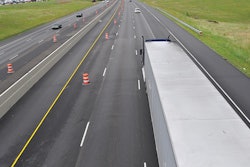PARTNERS IN BUSINESS TABLE OF CONTENTS »
Best practices for healthy cash flow, debt avoidance and identity protection
It’s important to create a separate bank account that will be used to manage the income and expenses of your business. All income from your trucking business should be deposited there. In addition, trucking expenses should be paid out of this account. In the event of an IRS audit, having personal finances mingled with your business could cost you thousands of dollars. In addition, it will be impossible for you and your accountant to analyze your business accurately if your personal finances are mixed in with your business.
Every month you should write a “distribution check” or make a direct transfer online from your operating account to your personal checking account to cover your personal living expenses. The target amount can be determined by looking at the monthly personal and family cash requirements shown in your budget.
RESERVE ACCOUNT
Saving is not easy. It’s much harder, though, when you deny the inevitable. Remember AIG? American International Group’s fatal exposure during the financial crisis of 2008 was insuring bonds blindly based on subprime home loans. When it came time to pay up, AIG had its pants down. It had to rely on a $183 billion taxpayer bailout to honor its commitments.

Like insurers and banks, you’re subject to developments that could threaten your livelihood. At the very least, you know your equipment will wear out. Smart owner-operators save for maintenance in proportion to miles run. See Chapter 12 for savings recommendations.
The best owner-operators have at least $5,000 in reserve before they ever go into business. The purpose of the reserve account is to set aside money for large or unforeseen items that could put a substantial drain on your operating cash, such as major maintenance items, tires, quarterly estimated taxes and insurance deductibles.
CASH FLOW PROBLEMS
A few sure ways to avoid financial trouble as an owner-operator:
MINIMIZE CASH ADVANCES. When they become owner-operators, many drivers carry forward the company-employee habit of taking weekly cash advances for expenses.
Undisciplined owner-operators have been known to use that cash on unnecessary accessories, entertainment and other unbudgeted expenses. Frequent and unwise use of cash advances can make it difficult to get a true picture of where your money is going. Also, since this cash already is deducted from your settlement, it can be mentally defeating to keep getting small settlements. In addition, transaction fees can add as much as 10 percent to the advance.
Work toward using your business operating account, not cash advances, to manage your cash flow.
AVOID BEING OVER-LEVERAGED. Back in 2005, free-wheeling lenders and home buyers thought housing prices would rise forever. Lenders made ridiculously large loans to borrowers with ridiculously low incomes and credit ratings. It was just a matter of time before widespread defaults would bust everyone’s bubble.
It can be easy for an owner-operator to rack up too much debt. A large truck loan with double-digit interest is bad enough; throw a few maxed-out credit cards in the blender, and you’ve got a deadly concoction. Successful owner-operators never take on more debt than they can manage to repay on a regular schedule.
AVOID OVERDRAFTS. There’s nothing like logging in to your bank account to see a negative balance and outrageous overdraft fees. Numerous banks use a tiered structure for those fees; they go up as more checks bounce. And some banks have developed keen memories. That check that bounced a year ago could mean your next mistake will trigger the tiered rate.
• Monitor your account. Record every check as soon as it’s written. Don’t forget debit card purchases. Develop a system for logging automatic monthly drafts, such as for utilities, whether it’s an item in a spreadsheet, a note on a calendar or a future entry in your checkbook.
• Use overdraft protection. Most banks offer this service, which automatically draws from your savings or credit card account to cover a bad check. If using savings, you obviously need to keep a good stash to make it work. Linking to a credit card is a less favorable option, but if it’s paid off quickly, it’s still a lot less costly than bouncing a check.
• If you don’t have online account access, get it. Even if you don’t pack a computer on the road, once you’re signed up at your bank or credit union for mobile banking via your smartphone, you can manage your finances anywhere you have web access or a cell signal. That includes checking your balance and cleared checks and purchases, as well as deposits and moving money from one account to another.
INDEPENDENTS, USE A FACTOR. The demand for cash when starting your own company presents many challenges. Late payments, long billing cycles and high fuel costs contribute to why half of small businesses fail in their first year.
If operating under your own authority is your intention, consider using a factoring company to enhance cash flow and provide the support that will help build up your cash reserves. Factors offer independents quick access to the cash tied up in their invoices, less a discount.
Factors such as TBS Factoring Service also provide benefits that include collections, broker credit information, accounting services and discounted fuel networks with significant volume savings.
There are two types of factors. With recourse factors, if the factor is unable to collect on certain invoices, the factor retrieves its payment from the owner-operator, who is ultimately responsible for the collection. Nonrecourse factors are the opposite, and since they assume total responsibility for collecting, the rate (typically 5 percent) they charge will be higher than that of recourse factors.
CREDIT CARDS. It is useful to have a business credit card. However, owner-operators often spend too much because the using the card is seemingly painless. Yet if a credit card balance is not paid off at the end of each month, the interest charges, sometimes exceeding 18 percent, can mount rapidly.
You’ll get the best rate on credit cards, as well as other forms of lending, by keeping a high credit rating. Federal law now requires each of the three major credit reporting companies to send you a free copy of your credit report, on request, once a year. Visit www.annualcreditreport.com.
If you’re going to use credit cards, reap the benefits of use by selecting one with a rewards program. Many credit cards have programs that reward use of the card with merchandise, travel credits or other incentives. For business use, cash-back rewards are usually the most measurable and cost-effective. Bankrate.com offers comparisons of current rewards and other terms for leading cards. Study offers carefully because high annual fees and interest rates can wipe out the value of rewards.
ALTERNATIVES TO CREDIT CARDS
Comdata and similar fuel cards are available to independents looking to combine maximum fuel discounts with the accounting aspects of a debit card tied to a traditional bank account. For single-truck and other small fleets, the Comdata discount fuel network can be opted into for discounts off the cash price. As part of Mastercard’s Maestro point-of-sale network, all Comdata cards are usable anywhere the Maestro logo appears. Comchek Mobile in recent times also has taken funds management to mobile devices.
Another is the FleetOne Truckers Advantage card for Owner-Operator Independent Drivers Association members. The NASTC Quality Plus Network for National Association of Small Trucking Companies members is also well-known for access to discounts comparable to large-fleet volume discounts.
LOOK FOR BIG UPSIDE POTENTIAL
Before the housing market showed visible signs of impending doom, a scattered handful of clever guys studied mortgage data that seemingly smart people overlooked. The few independent thinkers, and later others, placed virtual bets that trillions of dollars in home loans were going to go bad within months. They could lose a little if they were wrong, but could make fantastic profits if they were right. They were.
Likewise, most owner-operator businesses stick to a leased operation with ordinary freight. That’s fine for an operator who’s satisfied with his net income. Those with large incomes, though, almost always have grasped opportunities others overlook.
It could be shippers ripe for the picking by a small independent operator. It could be niche hauls that require special trailers, elaborate securement or tedious government clearance. Making these moves requires risk, money and time, but the return can be substantial.
Such opportunities increase on the recovery end of economic cycles. It’s easy in the flush of good times to forget lessons so clearly illustrated during hardship. It’s best to have a good memory.
Download the entire Partners in Business Manual
Chapter 1: Becoming your own boss
Chapter 2: Bookkeeping and business analysis
Chapter 3: Understanding your revenue and costs
Chapter 5: Controlling fuel costs
Chapter 6: Controlling tire costs
Chapter 8: Income tax and other taxes
Chapter 9: Choosing a business structure
Chapter 10: Truck buying, leasing, financing
Chapter 11: Choosing a trailer
Chapter 12: Maintaining your equipment
Chapter 13: Choosing a carrier
Chapter 14: Computers, mobile devices and the internet
Chapter 15: Staying compliant and safe
Chapter 16: Trucking insurance








